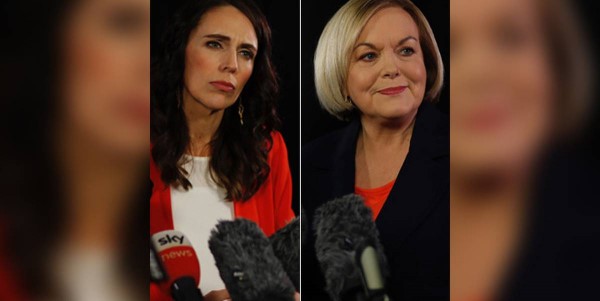News
14 October 2020
Election 2020: Implications for the economy
It’s crunch time – the polls for this year’s General Election close this weekend. We recently focused on the main political parties’ offerings for seniors, but what about the economy in general? How different are the main political parties’ key policies and how does it bode for the future?
Early indications are voter turnout is looking good this election, with Radio NZ reporting that early voting has exceeded the Electoral Commission's expectations, with more than one million votes already cast by Monday 12 October.
At the time of writing, polling suggested a centre-left government was on the cards, according to an election backgrounder released by ASB bank. But there is much water to flow under the bridge yet -as we know with politics, it’s not over until the votes are all counted. And even then, with the Mixed Member Proportional (MMP) system in place, the outcome still may not be clear. With the 2017 election, it was nearly a month after the polls closed before we knew who was wielding the power.
ASB has studied the key policies of the main political parties and describes the first political bloc that has formed as Labour/Greens/NZ First, which it refers to as Labour+. However, it notes that polling suggests Labour could almost form a government outright or with some help from the Greens.
The second political bloc as National/Act – the challengers, or National+, with polling for this group in the late 30’s to low 40’s percentage points.
ASB senior economist Mark Smith says there appears to be only “modest” differences between the big two parties - National and Labour but finds “starker” differences between the potential support parties - namely the Greens and Act.
He highlights a lack of focus in this election on providing a clear long term strategy, saying that while it is understandable that the spotlight be on the “here and now” during a one in 100-year event like Covid-19, articulating a long-term strategy would still be helpful.
ASB has outlined six key areas where policy positions differ, including broader economic management, fiscal policy, taxation policy, government spending, superannuation and environmental regulation.

| Key Policies |
|
|
| Economic management | Competent manager, although concerns over increased regulation. Light on articulating a longer-term vision. |
Look to reduce the role of government in setting direction. Lighter touch on regulation. Lacks long term vision |
| Fiscal management | Prudent, recognition of importance on more fiscal support via higher fiscal spending. | Prudent, recognition of importance on more fiscal support via tax cuts. |
| Tax policy | Redistribution. Tax increases for higher income earners. Broadening the tax base. | Stimulatory. Temporary tax cuts. Depreciation allowances to promote more capital expenditure. |
| Government spending | Focus on provision of quality public services and income support for less well-off. | Focus on expenditure restraint and spending reprioritisation. |
| Superannuation | Keep retirement at 65, maintain contributions to Superfund. | Debt repayment vs contributing towards Superfund. (Eventual) phased increases in retirement age to 67. |
| Environmental | Increased regulation so as to achieve objectives. | Lighter touch, with more emphasis on self-regulation. Agriculture excluded from Emissions Trading Scheme |
Broader economic management
The big difference here is that the incumbents (Labour+) appear to favour what ASB describes as a “top-down approach”, in which the government, businesses, organisations and unions agree to a plan. Meanwhile, the challengers (National+) are more market-friendly, preferring a “bottom-up approach”, leaving it to firms and households to grow the economy, while pushing back on some regulatory changes, ASB says.
This is an important area given that fiscal policy (government spending and taxation) will have an important job to do in supporting the economy during these tricky times, as well as “setting the platform for economic growth beyond the crisis stage”, Smith says. It notes the lack of “coherent” long-term visions from both sides of the political spectrum.
“There is not much to separate both camps, with each laying claim to providing strong and stable economic management,” Smith says.
“What is lacking is a coherent longer-term vision from both sides of the divide, beyond a few broad slogans.”
Fiscal policy
This is largely a case of same, same, with both Labour+ and National+ focusing on offering stability, eventually delivering fiscal surpluses and repaying debt in a way that is palatable to the competing demands of the electorate, financial markets and the ratings agencies, ASB says.
“We would like to hear more from both parties on how they would tackle fiscal challenges posed by population ageing. Merely stating that they would grow the economy without providing a credible vision of how this will be achieved does not cut it in our view,” says Smith.
Taxation policy
Both political blocs are proposing what ASB refers to as “incremental changes”. However, Labour+ would put their efforts into increasing tax rates for top income earners, while National+ would stick with a flatter tax structure to incentivise firms and businesses.
“In our view, the current debate over tax between the major parties has lacked the courage and longer-term focus to tackle fundamental longer-term challenges. The NZ tax system looks to be overly reliant on the taxation of income, whereas our taxation of capital gains is very light compared to OECD peers,” Smith says.
Government spending
One thing we haven’t been short of lately is public spending, largely due to Covid-19 and the need to grease the economic wheels. However, with public spending set to approach 40 percent of GDP this fiscal year, ASB says effective government spending is of “massive importance” to the NZ economy.
“Tougher controls on government spending could potentially trim some of the fat in the public sector bureaucracy, but they could also cut into muscle (hampering the provision of public services), squeeze lower income earners and exacerbate the downturn,” Smith says.
Superannuation/retirement saving
None of the main parties are brave enough to consider increasing the retirement age at present. However, while Labour+ are keen to keep the retirement age at 65 and maintain contributions to the Superfund, National+ have voiced different ideas in the past. Historically National has said they want to eventually increase the retirement age to 67 and more recently said it would stop contributions to the Superfund.
“NZ is swimming against the global tide of increases to the retirement age given increases in life expectancy. Kiwis are also poor savers and we need to build up more of a retirement saving nest egg,” Smith says.
Environmental concerns
It is climate change, not COVID-19 that is the major challenge over the coming decades, according to ASB. It notes that Labour+ would increase regulation to achieve environmental objectives, while National+ would have a “lighter touch” with more emphasis on self-regulation.
“Add to that the increasing global scrutiny on the environmental footprint of agriculture. NZ’s agricultural producers are amongst the most efficient in the world, but there is still some way to go. Urban Kiwis are miles behind the more environmentally conscious Europeans. Either we adopt more stringent environmental policies or place more faith in the ability of the households, the rural sector and other firms to adapt and put things right,” Smith says.
Implications for the markets and wider economy
Markets and the economy in general like stability. So, the clearer cut the election result is, the better, Smith says. A period of uncertainty is not ideal and can increase volatility in the share market and lower the NZ dollar until the outcome is known.
Smith adds that traditionally markets like the more market-friendly policies of the centre-right. However, the Labour-led government has managed to make “inroads in portraying itself as a competent fiscal manager”, Smith says.
“As such, we expect currency and interest rate reaction from a Labour-led victory to be modest,” he says.
Let’s hope we’re not left waiting around to find out who’s wielding the power once the election booths shut. With Covid-19 currently trampling over economies worldwide, there is plenty of work to be getting on with.

This is an important area given that fiscal policy will have an important job to do in supporting the economy,
What could your income be?
Lifetime Income is a fortnightly paycheck, but without the work or the worry, find out what your income could be with our Lifetime Income Calculator.


